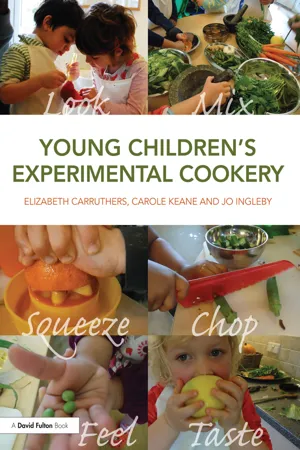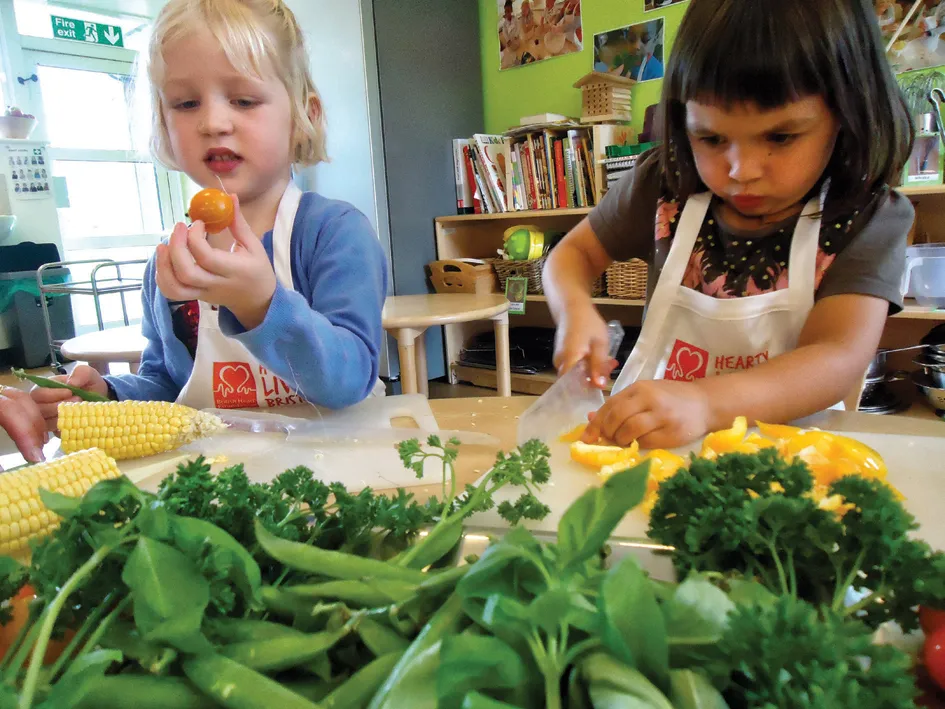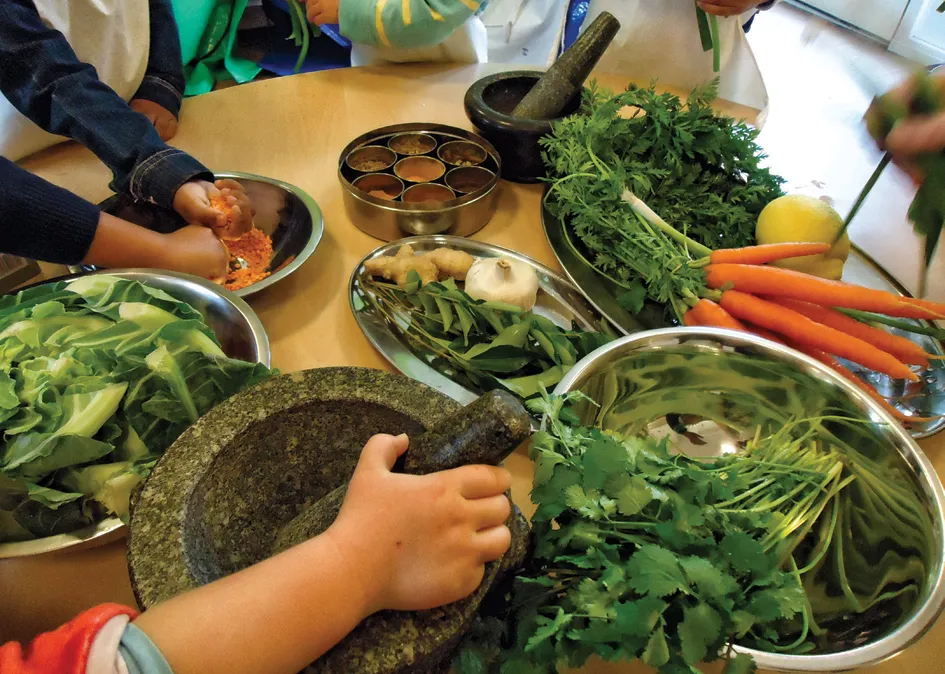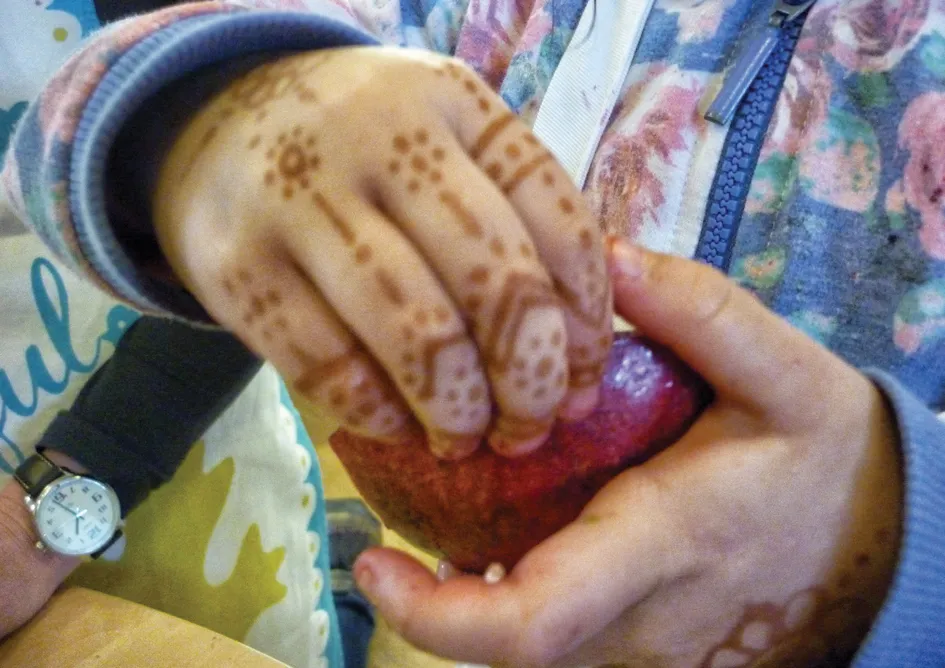![]()
Chapter 1: Introduction
In 2006, Redcliffe Nursery School and Children’s Centre was invited to take part in an innovative project called 5×5×5=creativity to promote creativity, curiosity and critical thinking in Early Years settings. We were given an artist, Jo Ingleby, who said she worked with a wide variety of visual arts. Our task was then to think together as educators and artist to develop an approach that supported children’s creativity. In our discussions with Jo (who would be coming in one afternoon a week for about 6 months) we realised her passion was more with food and that she was an experienced chef who had worked in a celebrated restaurant. I had worked with young children with food in an open way when I was a primary teacher, but really had only scratched the surface of what was possible in this area. Many questions arose including how we would even start this project about food. Together, Carole Keane, the educator, and Jo Ingleby, the artist/chef, in collaboration with staff, children, parents and governors of Redcliffe Nursery School and Children’s Centre, took up the challenge of working with children, with food as a provocation. This has been a long journey which will continue to grow.
As I write now in the winter of 2017, it is important to look back and applaud the sustainability of such a project. The food project is no longer a one-off project of creativity but an integral part of what we do at Redcliffe. It is through perseverance of what we increasingly value about children’s food culture that has made this journey so successful. When many nursery schools in Bristol were closing down their kitchens, we bucked the trend and decided to put any extra money into opening a kitchen (we had no kitchen at the time). At first there was no space and no money to do this. Luckily we acquired an Early Years grant and eventually the tenants of the neighbouring block of council flats agreed to us taking over some of their storage space, which we converted into our very first children’s kitchen.
Through our food journey we have reflected so much on the word ‘creativity’ and what that means. We have considered that it is a redundant word and that one can just jump on the creativity bandwagon. The truth, as we see it at present, is that we, as human beings, are naturally curious and experimental and even more so when we are children discovering the world around us. As adults working alongside children, the key is not to be controlling but instead to let go of narrow ways of seeing the world; to be equal collaborators with the children, not only in food but in all areas of knowing. In opening up food experiences for children, we have seen children becoming connoisseurs of food and developing a palate for tasting and a keen awareness of smells. We have developed so much as a staff team in our understanding of the importance of food knowledge for young children. We try not to become hijacked with trying to fit in all standard curriculum areas as this can diminish the children’s experimentation with food. We have grown and learned from many people and collaborators, but most of all from the children and their families.
Elizabeth Carruthers, Head Teacher, Redcliffe Nursery School, Children’s Centre and National Teaching School, Bristol, UK
A Food Session with three-year-olds
![]()
Chapter 2: Food, cooking and creative thinking
Our evidence supports the use of food as a creative medium in affording high-quality learning experiences in all areas of learning. In the sessions children’s thinking is challenged and extended; all individuals are seen as creative thinkers and problem solvers.
These are not traditional cooking sessions!
Sessions are far from traditional cookery sessions. There are no recipes to adhere to, minimal adult direction (only related to health and safety issues) and no planned outcome in the form of something tangible and edible. This is in contrast to traditional cookery sessions in schools which often involve the making of items such as fairy cakes and where the children contribute very little to the session. In these ‘fairy cake’ sessions there is no opportunity for experimentation, or choices of what to make, or in the selection of ingredients. Sometimes children only get to stir the mixture, taking turns. They do not get to touch the food and instead are kept at a distance from it.
In comparison, our Food Sessions are inclusive, open-ended experiences that are interactive, and where the children lead and are completely involved. The children therefore are allowed to be real problem solvers as they experiment with the ingredients.
‘The potential for every child is stunted if the end point of learning is formulated in advance.’
Rinaldi (1998)
The book aims to provide practitioners with an alternative approach to introducing children to food and cooking in the wider context of healthy eating and national concerns about a growing obesity problem. We will celebrate children’s thinking through a range of case studies. The book also includes practical suggestions for resources and there is an illustration of a typical Food Session.
Exploring herbs and spices
Food: Any nutritious substance that people or animals eat or drink or that plants absorb in order to maintain life and growth.
‘Food’, Oxford Dictionary
It is within the context of creative thinking and intellectual curiosity that we have developed our food research project. We also believe that our project is a good way of encouraging healthy eating by encouraging a familiarity and confidence with fresh produce. We link this to the food that the children eat for lunch by using the same produce in Food Sessions that are featured in the menu.
A Government report (Butland, 2007) stated that obesity had more than doubled in the last 25 years in the UK and predicted that by 2050 it could be a mainly obese society. In 2016 the government produced an action plan around childhood obesity in which they proposed various measures to tackle the problem, including a soft-drinks industry levy and clearer food labelling which they claim will ‘significantly reduce England’s rate of obesity within the next 10 years’ (Cabinet Office et al., 2016). In line with this target, the secretary for health has challenged all sectors of the food-and-drink industry to reduce, by 2020, overall sugar in products that contribute to children’s sugar intakes by at least 20%.
The UK Foresight Report of 2007 saw intervention in the early years of a child’s life – at home, nursery and school – to be an effective way of dealing with the problems of obesity. Other countries, including Denmark, Sweden, the Netherlands, France and Switzerland, have successfully introduced effective initiatives in primary schools and kindergartens to encourage young children’s healthy eating. Bee Wilson writes about the ‘Sapere’ movement. She describes how between 2009 and 2014 the government in Finland funded Sapere food education in all kindergartens in the country to the extent that now there are around 7,000 professionals in Finland who are trained in the Sapere approach. The Finnish project was motivated by alarm about childhood obesity levels which were notably higher than in neighbouring countries. Children in the first kindergartens to adopt Sapere were encouraged to explore ingredients with all their senses. Wilson (2015:341) writes that ‘the aim of Sapere is to get children to know their own authentic tastes’.
Our approach to teaching children about food as well as through food began in 2006. Since then our Experimental Cookery approach has become embedded through our centre and beyond.
Food waste
One issue which we have tackled repeatedly, and have been asked about by other practitioners, is that of wastage. Can we justify the ‘wastage’ of food in times of financial hardship and in a world where food shortages are such a concern? We believe that the understanding of ingredients that the children gain from the sessions and the creative processes they develop, justifies using food in a free way, but with little waste.
Exploring pomegranates during Diwali
Economical ingredients are used – often reduced or value ranges in supermarkets, or grown in our gardens and allotment, sometimes donated or bought in bulk. On average, ...







